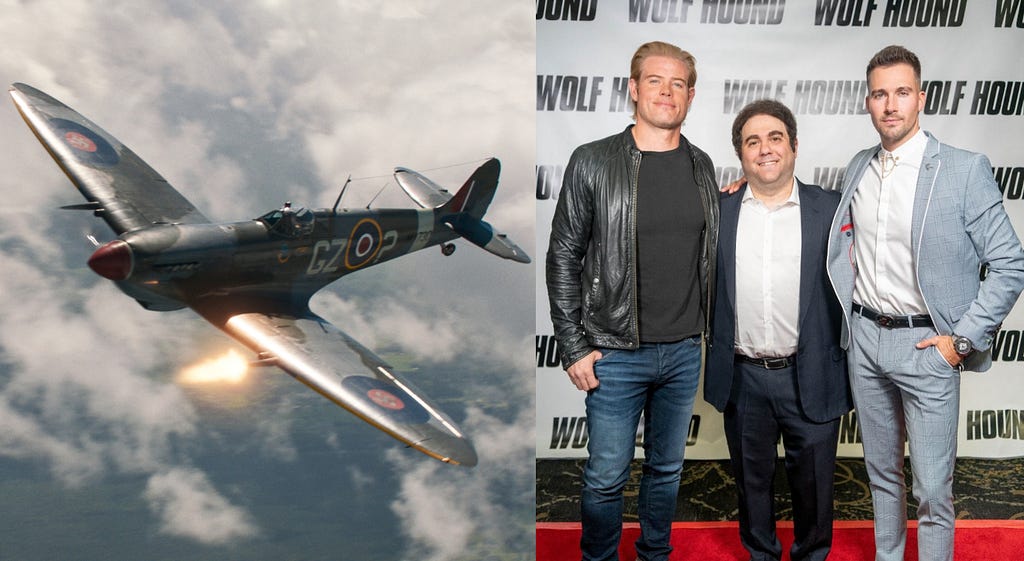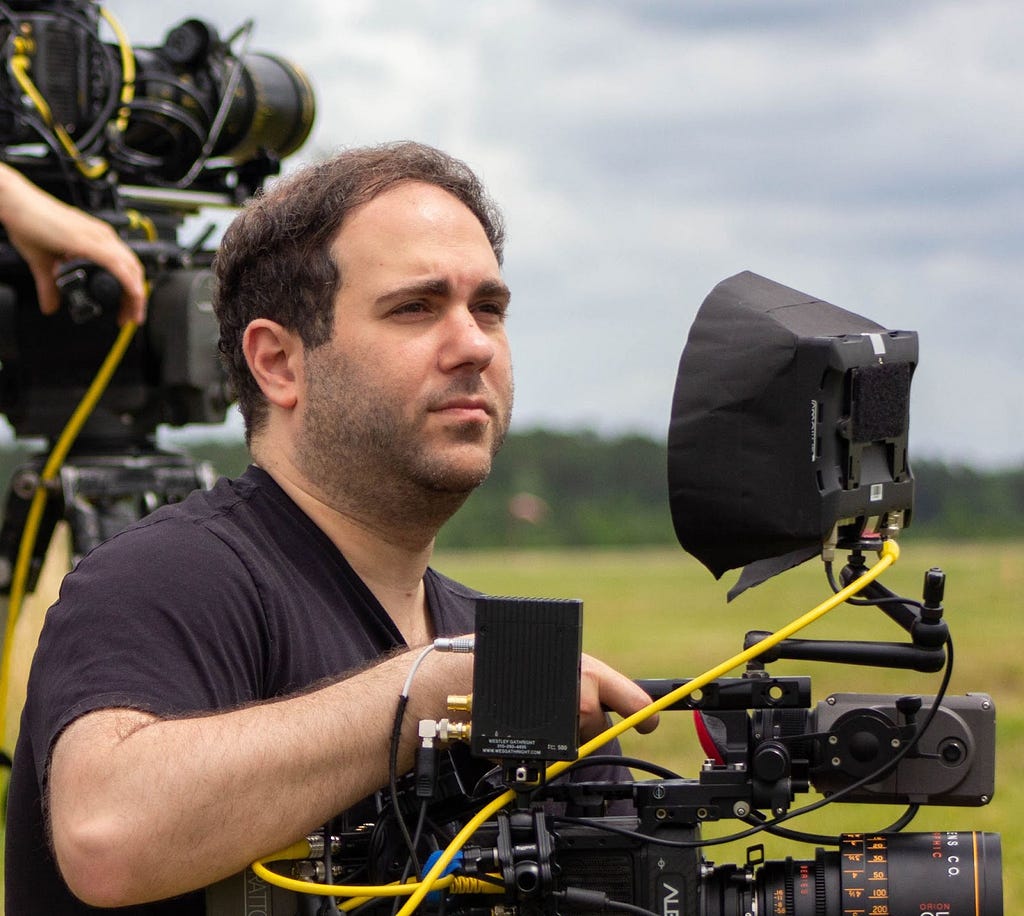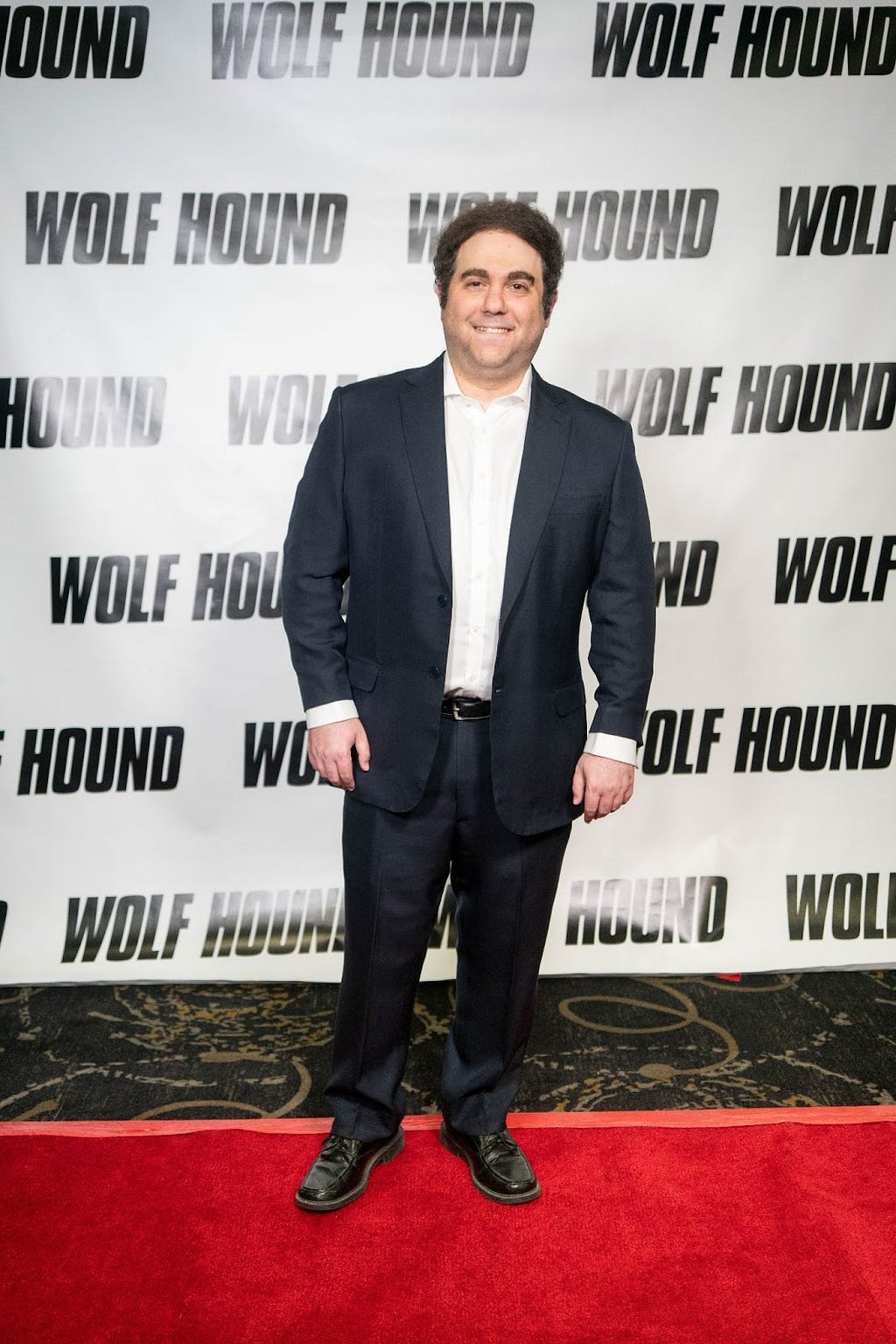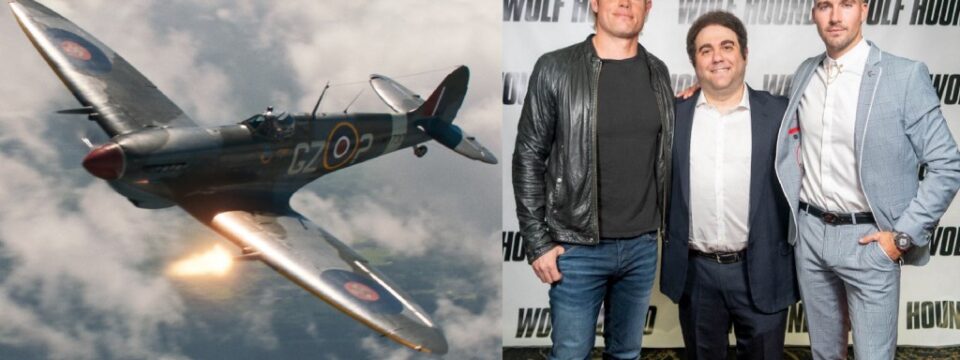Michael B. Chait Of Wolf Hound: 5 Things I Wish Someone Told Me When I First Became A Filmmaker

…if it’s taking a little longer, that’s okay, because everybody has their own speed. Everybody has their own destiny calendar-wise and it doesn’t matter if this director or that director that you’ve admired made it when they were twenty-two or some made it when they were fifty. It’ll happen in its own time, as long as you keep going for it.
I had the pleasure to talk to Michael B. Chait. The son of a pilot and an artist, Michael’s passion for acting immediately switched to Filmmaking after seeing THE ROCK when he was 12. Since graduating from Columbia College Chicago in 2006 with a BA in Film/Video, Michael has Directed Commercials for clients including Volkswagen, Honda, The Yankee Air Museum, TBWAChiatDay NY, DDB, Falcon Motorsports, National TV Commercials for Lingenfelter Performance Engineering and The U.S. Air Force/Air National Guard, and Music Videos for Artists including Apl.de.Ap of The Black Eyed Peas. Michael recently released his Feature Film Directorial Debut, the World War II Action Movie “Wolf Hound” starring James Maslow and Trevor Donovan, distributed by Lionsgate on June 3rd, 2022.
Thank you so much for joining us, Michael. Our readers would love to get to know your backstory, your origin story. Can you share with us a story of how you grew up and what led you to this career as a director and filmmaker?
I grew up in West Bloomfield, Michigan. My parents were both from Oak Park, Michigan, which is a pretty Jewish area, and so I grew up in a Jewish American family here. For my entire childhood, my dad loved WWII movies and aviation, as he’s both a pilot himself and was a WWII enthusiast since childhood. So, I really got an introduction and an education to what eventually would be the subject of our first movie very early on growing up. I think I fell in love with movies, literally by the time I was five years old. I remember, that the first two movies I remember seeing on my parents’ old VHS player were Top Gun and Star Wars, and I just was watching them over and over and over and over again.
And I was obsessed with movies from that point. Originally, I wanted to be an actor or maybe a fighter pilot- before I knew what being a fighter pilot would entail. Fast forward to when I was 12 years old, I was studying for my bar mitzvah, just so many things going on at that point, and I happened to see on television The Rock ,that Michael Bay directed from 1996, and a switch went off in my head! I just thought, “Oh my God, I’ve always loved movies, but I’ve never noticed the camera work, the lighting, the field, the style, the emotion of what the director is doing, and how much that affects the storytelling, how much that creates the cinematic experience for the audience.”
It was like a revelation! Within a few seconds, I thought, “Okay, I need to do that. That is the only job that I’m going for. That is what I have to do for life, and I’m not going to take no for an answer because it’s just so cool!”
It checked every box in my mind of what I would love to pursue and what passion I would love to go for. I then spent the rest of grade school, right through senior year of high school working for that. I got a video camera, which I used my bar mitzvah money to buy. I would film every weekend and used every chance I got, forcing my friends to be actors, making shorts, and making stupid little movies in my backyard. Then, when I graduated from high school, I went to Columbia College in Chicago- that was the closest film school and I’m very family oriented. I didn’t love the idea of moving all the way to Los Angeles or New York. I thought, “Chicago sounds pretty good and I had heard some really good things about their film program.”
As soon as I got there, I was in heaven! It was the first time that I was around all these like-minded people that also had this same dream and the same passion! And I really used all four years, from 2002 to 2006, to just practice as hard as I possibly could, develop technical skills, artistic skills, and communication skills. I had no idea that I hadn’t had any idea about what goes into directing. That was invaluable. I also met many of the same collaborators, like my composer, my director of photography, my editor, and my writing partner.
I met them all in college at Columbia- which is very rare to find your team that early, but it just clicked. As soon as college was over, I started directing commercials and some music videos. I had some missadventures out in Los Angeles, trying to get two previous movies made that didn’t happen, but I learned a lot about the business. Then in 2013, I moved back to Detroit and I was lucky enough to direct a commercial for the Yankee air museum, which is this great organization here that preserves and restores aircraft from WWII, also Vietnam, and some WWI stuff. But their crown jewel is their B17 flying fortress bomber, and that’s what I was hired to make a commercial for. They have customers that take rides in it, they call ’em “Experienced Flights,” and you go up for like 45 minutes or an hour and you get to fly in the actual bombers from World War II.
There are only nine left in the entire world that are flyable today. So as soon as I stepped on that aircraft to do a location scout, figure out where I was going to put the camera, and what I was going to do, literally, a wall of emotion hit me! That was very unexpected because I just realized that I’m standing right where the 18 or 19-year-old kids that actually flew, fought, and many died fighting for our freedom against the Nazis. I’m literally standing right where they were and this is where they literally worked eighty-some years ago doing that. Just the emotion that came over me, I thought of two things. One, this has to be a really good commercial and do them justice. Two, I thought, “I’ve been trying to make a movie for years. I think there’s a movie here.”
I think this could be it! This could be a way in making something that could really happen! Having the resources and the aviation world came from growing up at airports and around all these pilots through my dad, and my artistic side came from my mom, who is a painter, sculptor, and artist herself. So, then we started writing the script in 2014. It was a long journey to get the financing, to get the cast interested, and to get James Maslow- who plays our hero. He finally got interested and said yes, in 2018. So again, that was a long four years from starting to write it to the movie started to happen.
And then, as soon as he said yes, it was like dominoes falling and a huge whirlwind. We were filming a few months later and we filmed it in 2018 and 2019. It had to be split up because of the weather and being rained out the first time. We filmed a bunch of the aerials in Virginia Beach with the Military Aviation Museum lending six out of the seven Aircraft that are in the film, again, all WWII planes and extremely rare. We treated them like gold. In 2020, when the pandemic hit, thankfully we had filmed everything, and for the next two years we did all the post-production just from our houses, just remotely over the internet. I was working with my team in LA and in Chicago, finishing it over the computer, and that brings us to now. The movie came out on June 3rd and honestly- it’s been completely surreal and like a “pinch me” feeling every single day since then. This is literally the dream that I was chasing since I was 12 years old and I still can’t believe that it’s finally starting to happen.

That’s a really amazing story and you told it so well. So, I read that it’s in contrast to a Top Gun, which took about 200 million to make. Your film took much, much, less. So, can you explain how that’s possible? The production value is extremely high. It looked like everything was shot inside of an airplane. Can you tell us how you did that? How were are you able to produce such high production values at a relatively low cost?
You are correct and, and I would say that it was definitely an independent shoestring budget for what we accomplished. There were actually no blue or green screens ever used in the movie. That was one of my goals because I always think that looks fake. Even when you have a hundred million dollars, it still kind of looks fake. You can still kind of tell and what we did was, we either filmed the actors up in the real planes with the real sky behind them, or we filmed it on the ground with the real sky, just out of focus, out the window and shaking the cameras to give the illusion that you’re up there. I’ll tell you the most direct way to answer your question and I don’t mean this with any ego or pompousness at all. Ever since I was 12, literally when I picked up my first camera I was holding myself to the standards of my favorite movies, Terminator 2, Star Wars, Top Gun, Indiana Jones, just all of the big-budget movies that I grew up loving. Most people would think, “Oh, you’ll get to that level later. Just focus on other things.”
I always thought, “Wait a minute. No. If I’m going to bother filming something, I want to teach myself how to make it look really good, even if I have no money.”
It was just me, a couple of people, the sun, no lighting and, and a camera. I wanted to learn how to shoot like that and so I kind of taught myself by watching my favorite films over and over again. I learned how to develop the visual style that I gravitated towards and how to make little things look big by the camera angle, the editing or the lighting, just to you present it and my entire commercial and music video career.
And so, we’ve always kind of gone many extra miles and many, many people do that. I’m not saying we’re the only ones, but we always really bust our butts to have extra-special lighting, use the right lenses, and to use the best possible format available to us. For example, learning how to make things that are made out of cardboard look like they’re metal, and just make it look like there’s way more Nazi guards than there actually were. I think we had 20 to 25 depending on the day and we had to make it look like there were hundreds of them- and that’s again, just a lot of practice and learning how to make stuff look big and feel big on a lower budget.
And also, always thinking about how would my favorite directors have done it, instead of just surrendering too “Well, we don’t have a lot of money, so we’re not really going to try.” I’ve always just thought that “good enough” is not in my vocabulary! It always needs to be spectacular and that’s how we went into this movie.
And thankfully many people have told me in the industry, some of my favorite directors that I’ve been lucky enough to become friends with — have said “This looks like a hundred million dollar movie!” That’s thrilling to hear, just knowing how down and dirty it had to be when we were shooting it.

It’s funny that you mentioned Indiana Jones, because that was exactly what I thought. I thought the first part was like Top Gun of World War Two and the second part was like Indiana Jones. It really came through. You really were able to evoke that cinematography and that feel.
I’m thrilled to hear that because that’s exactly what we were going for- Top Gun mixed with Indiana Jones! That, that kind of fun, action-packed, eighties and nineties movie, that’s escapism more than a gritty documentary. I think some audiences have been surprised because they were expecting more saving private Ryan, but this is very much intended to be Indiana Jones style.
So, this is our signature question and we ask this in all of our interviews You’ve accomplished a lot, Michael. Looking back, are there five things you wish someone told you when you first started as a filmmaker and why?
Oh wow. Five things. Yes, let’s see.
- One would be the advice that I give to anybody who asks me advice, which is very straightforward. Never let anyone rob you of the fire and the passion and the heart that you have to want to be a filmmaker to begin with. Because you’re going to get hundreds and hundreds of people telling you “No, you can’t do this,” or “Don’t do this career, become a doctor, a lawyer or an accountant. Don’t be a filmmaker.” I think very similar to people, that go into any of the arts. There were times over the last, you know, 15, 20 years where I truly thought, “Man, this is not going well. I’m, I’m not succeeding as fast as I’d hoped to, as well as I’d hoped to, and this project didn’t work out.” We still can’t get a movie, you know? I’m 37 when my first film came out and I wrongfully thought, if you don’t make it by the time you’re in your late twenties or thirties, you’re not going to do it. So number one, I wish that I could tell my younger self not to let anybody discourage you, keep that fire going, because you need that to succeed.
- Two is, if it’s taking a little longer, that’s okay, because everybody has their own speed. Everybody has their own destiny calendar-wise and it doesn’t matter if this director or that director that you’ve admired made it when they were twenty-two or some made it when they were fifty. It’ll happen in its own time, as long as you keep going for it.
- Number three. I guess I would say, spend less time on the shots that don’t matter as much. [Laughs] I kind of have been known to obsess over certain visuals or even the chess pieces. For example, that fall in the B17, when the two guys in the radio cabin are playing chess at the beginning. I did 74 takes of that close up! I wanted the pieces to fall just right with a close up and get the lighting right. Stuff like that, throughout my career, I think I could have gotten some hours back had I realized certain things you don’t need to obsess over quite as much.
- Number four. I would say, make sure that you have the right people around you and that you’re partnered with the right team. And if it doesn’t feel right, get out of it. There have been certain, like I said, missed adventures with previous movies that didn’t get made. Partially we weren’t ready, partially it was too expensive, partially it was the wrong team of people. Actually, finding your group, finding people that you can really not only trust, but you work really well with, that can take a long time. I’ve been told over and over again that when you find your right group of filmmakers, that’s usually when things start to happen.
- Number five. I would say the same thing, that people are telling me now -the Lionsgate executives, my awesome publicists, my parents, my friends, bigger directors whose work I admired growing up- and I’m lucky enough to be able to talk to them- slow down enough to really enjoy the great moments. Really stop and smell the roses and take everything in. It’s a whirlwind and you’re going a hundred miles an hour every day, but stop a little bit more than you have in the past. Let the stress kind of roll off and just realize, wow, you’re actually getting to do this and this is your dream. Love the journey, just as much as the destination. I think that would be number five. I hope those weren’t too longwinded and those were good answers [Laughs]
So Michael, because of the role you play, you are a person of enormous influence. If you could inspire a movement that would bring the greatest amount of good to the greatest amount of people, what would that be? Because you never know what your idea can inspire.
Oh, man. This might not sound so profound or maybe it may be…It sounds not as doable on a large scale, but here’s one thing I’ve noticed- and in a very big way. The world has become so divided, especially since the previous presidential administration with worldwide tensions. Don’t even get me started with the horror that’s happening in Europe, which so many people thought could never happen. What’s going on over there is just appalling, but things have gotten so divided, especially in our own country, more than I ever thought they would. But one thing that I’ve noticed is, that on film shoots, photo shoots, or music collaborations- and I don’t mean to sound naive saying this- I have seen people from the polar opposite sides, either politically, ideologically, or just people that have beliefs that could not be further apart- work together.
You’d think they’re going to start a fist fight with each other just by being in the same room! I have seen film specifically bring those people together to create entertainment, to create art, to create a product to entertain people, and to bring joy to people. They were working together, hand in hand, as if they were on the exact same political page! Any kind of issue could spiral out of control these days in less than 30 seconds- if you strike up a conversation with someone that thinks the opposite of you on the street. Yet, I’ve seen people work for weeks and months together towards creating art, towards creating entertainment. In my opinion, that is something for the greater good because it lifts people up, it brings people together, and it lets people escape from horrible problems even for a few hours at a time.
Just seeing the most right-wing and the most left-wing, extreme personalities, collaborating hand in hand, and laughing, and having a great time and, and making a movie together, or a music video or commercial… It’s really astounding. And as soon as that is over, some of the time, the arguments can come back, but a lot of the time friendships have stayed solid. I haven’t really thought about it this much until you asked me this question, but I think that the more that people would collaborate together, whether it’s on art, entrepreneurial stuff, on technical development, on medicine, specifically on filmaking-on just anything that you put your heads together as a group and bring your own best… I wish more people had experiences like that. I wish that more classes were taught for the arts in schools, in colleges, and in programs after colleges so that more people could experience that kind of collaboration. There, you really do have to leave everything at the door and I think that can ease tensions and open people’s eyes a little bit more. I don’t know if that fully makes sense, but I tried to explain it the best that I could [Laugh].

One last thing. How can our readers further follow your work online?
Well, you can go to my website which is just my name Michaelbchait.com, Instagram and on Facebook at MichaelBChait. I’ll be continuously updating how the Wolf Hound release is going and the upcoming projects that we’re trying to do. We’re looking at hopefully making a Western as movie number two, or if something comes our way that’s even cooler, than that. For example, if someone contacted me from Hollywood and said, “We’d like you to do something with Star Wars and Star Trek,” I’d be there in 20 minutes. [Laughs]
Follow my social media and my website, I update that all the time. I can’t wait to see what comes next, let alone sharing it with everybody.
Well, Michael, thank you so much for your time. I really appreciate your wise and thoughtful insights. I wish you continued success, and I hope that we could stay in touch.
Michael B Chait Of Wolf Hound: 5 Things I Wish Someone Told Me When I First Became A Filmmaker was originally published in Authority Magazine on Medium, where people are continuing the conversation by highlighting and responding to this story.
